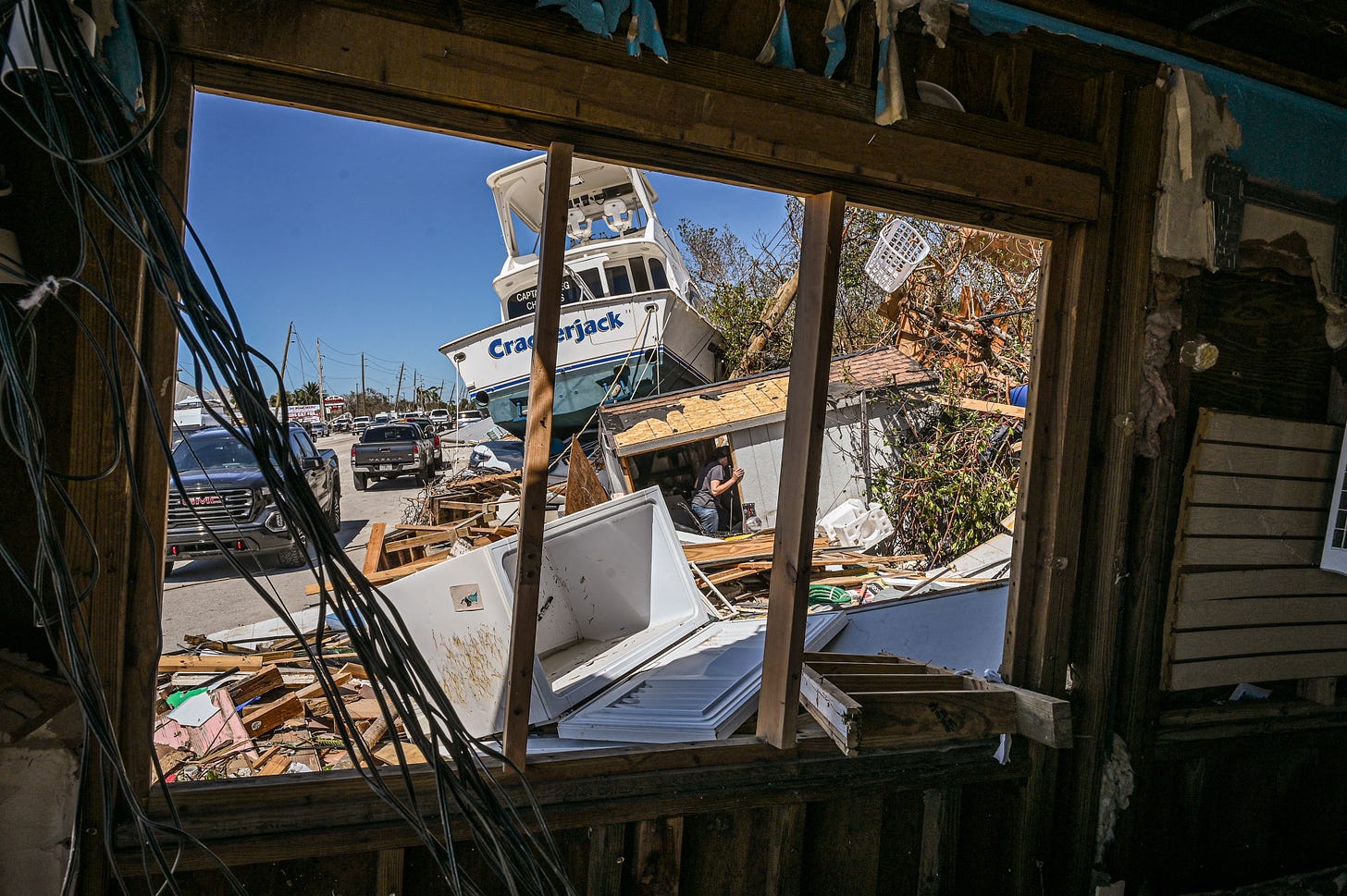Right now, the immediate concern for those whose lives and communities have been torn apart by Hurricane Ian must be survival.
Who needs rescuing?
Who is desperate for medical attention?
Who is without electricity?
How are broken roads made passable?
How are goods and services delivered to those in need?
And right now, the immediate concern for the federal government should be to produce all the help it can with speed, efficiency, and effectiveness.
The same prioritization applies (or should) to the responses in Puerto Rico, Alaska, and myriad other places hit recently by extreme weather events. These are crises, and they require acute action.
Time is of the essence. When lives are in danger, all other considerations should be secondary.
But it would be foolhardy to treat these calamities as only inevitable crises. Yes, hurricanes are natural disasters. Yes, they are part of our world and have been forever. But the idea that human suffering is an inherent byproduct of the forces of nature is just plain wrong. Humans might not create hurricanes, but we play a big role in determining how destructive they will be.
And that means we as a nation and as a world have got to start getting real about a lot of things, fast.
Our climate crisis is REAL.
And it is REAL that it makes storms more frequent and more severe.
Sea level rise is REAL. Because climbing global temperatures are REAL. And melting glaciers are REAL.
That we have made our coastlines more susceptible to storm surges and flooding by draining wetlands and clearing mangrove forests is REAL. That it is dangerous to fill these low-lying areas with dense human habitation is REAL.
The need for a well-funded and competent federal government to respond to natural disasters with resources and professionalism is REAL. And that a nation can find strength when its people look out for one another and avoid petty scapegoating and divisive politics is REAL.
It’s all well and good when times are flush to live as if there is no tomorrow. But on a host of environmental and social problems, that “tomorrow” is already yesterday. We are overdue for considering our vulnerabilities with a sober eye governed by science and not superstition, and data instead of dishonesty.
Our national discourse over the past several years has involved a lot of hot air — potent energy fueling Hurricane Trump. The winds of intolerance, divisiveness, and unseriousness have weakened us. Instead of focusing on existing vulnerabilities, we have created new ones, unnecessary ones, but ones we now have no choice but to address.
It turns out, reality does matter. We can’t ignore it forever. All the bloviating over the inconsequential by cable news and politicians prioritizing their own ambition cannot prevent a reckoning with the truth. They can only delay it. (The late Secretary of State George Shultz once told me those who denied climate change would eventually get “mugged by reality.”)
What gives me hope is that sometimes reality strikes with such fury that it can jolt people out of complacency. To some degree, we have observed that phenomenon with the Dobbs decision overturning Roe. When the theoretical becomes real, a lot changes.
On issue after issue, we have no choice but to get real. Let’s hope enough people realize it that we can rally to mitigate the damage. Sometimes out of destruction new resilience and innovation emerge. Sadly, these strengths are built upon pain and suffering from missed opportunities. But hopefully we can learn from these lessons to make our world safer, more secure, more equitable, and more sustainable going forward.
I am confident we can do that, if we get real.
Note: If you are not already a subscriber to our Steady newsletter, please consider joining us. And we always appreciate you sharing our content with others and leaving your thoughts in the comments.




I share the hope of getting real. But also, I'm in NJ where we have just instituted the first climate change curriculum in K-12 in the country. The reaction of some parents is foment anger about it, claiming mental health damage to their children for having learn and think about the climate and the environment. It's exhausting.
And, also, I remember "Give A Hoot Don't Pollute" in 1971 when I was in private school in NYC. No particular mental illness ensued. LOL
Seriously though, I have always thought that we would science our way of this (along with the conservation efforts), but we have not put the money into research that we need to. We let oil companies buy electric vehicle technology in the 1970's and they buried it. Roosevelt Island had an entire fleet of electric buses in 1976. It was meant to be a pilot for NYC and obviously, that didn't happen.
So, hopefully Ian becomes a tipping point in out national will to do something about it.
I hope that those impacted by Hurricane Ian remember that it was a Blue President who honored DeSantis's request for help before Ian even made land. Real help, Not throwing paper towels but tangible help. And those in the Carolina's and Puerto Rico who are an American territory. We are all human beings regardless the color of our skin or our religion. Be kind to one another and hope that a disaster every happened to you personally, be it tornado's, hurricane's, fires etc that we have a leader who cares regardless your station in life.